Comparing Solicitors and Barristers in the UK Legal System
VerifiedAdded on 2023/01/11
|7
|1888
|62
Essay
AI Summary
This essay provides an overview of the UK legal profession, focusing on the roles and responsibilities of solicitors and barristers. It explores the differences in their duties, including their interactions with clients and the court system. The essay discusses the ethical codes and principles that govern both professions, emphasizing the Solicitors Regulation Authority (SRA) and its role in monitoring ethical behavior. It examines how solicitors and barristers provide legal advice, represent clients, and contribute to access to justice within the UK legal system, while also acknowledging potential ethical concerns such as high fees and the potential for unethical practices. The essay concludes by highlighting the importance of ethical conduct in maintaining public trust and confidence in the legal profession.
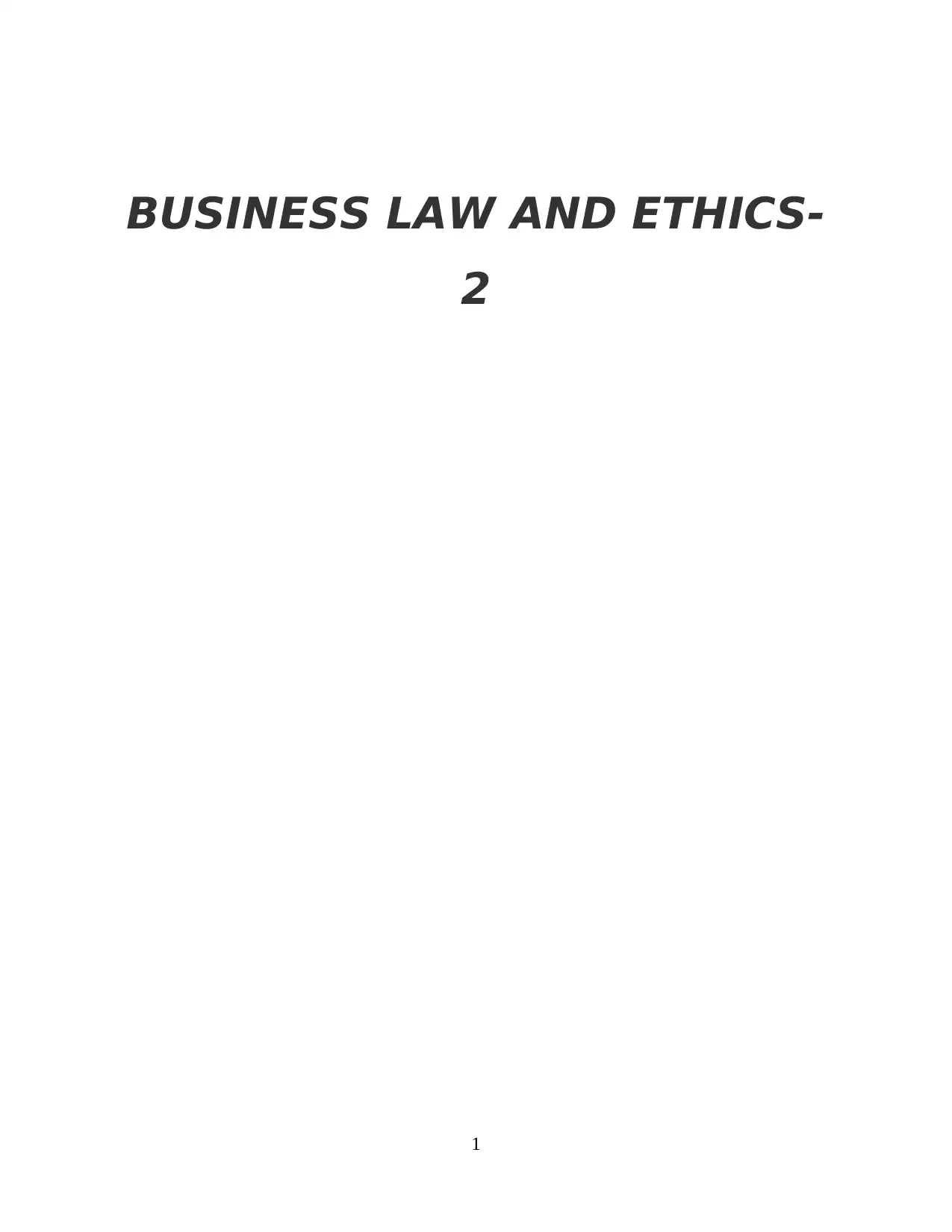
BUSINESS LAW AND ETHICS-
2
1
2
1
Paraphrase This Document
Need a fresh take? Get an instant paraphrase of this document with our AI Paraphraser

Table of Contents
INTRODUCTION...........................................................................................................................3
MAIN BODY..................................................................................................................................3
CONCLUSION................................................................................................................................6
REFERENCES................................................................................................................................7
2
INTRODUCTION...........................................................................................................................3
MAIN BODY..................................................................................................................................3
CONCLUSION................................................................................................................................6
REFERENCES................................................................................................................................7
2
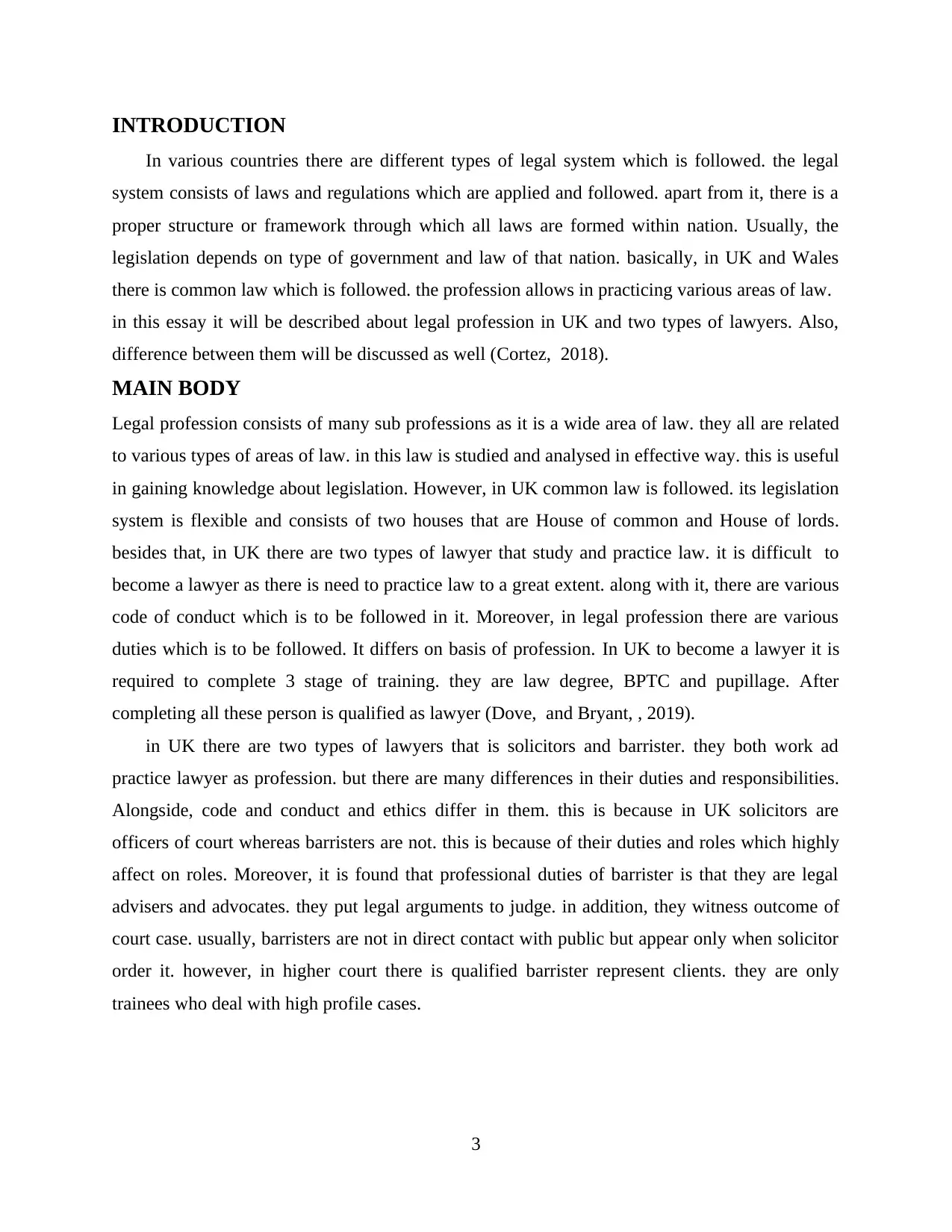
INTRODUCTION
In various countries there are different types of legal system which is followed. the legal
system consists of laws and regulations which are applied and followed. apart from it, there is a
proper structure or framework through which all laws are formed within nation. Usually, the
legislation depends on type of government and law of that nation. basically, in UK and Wales
there is common law which is followed. the profession allows in practicing various areas of law.
in this essay it will be described about legal profession in UK and two types of lawyers. Also,
difference between them will be discussed as well (Cortez, 2018).
MAIN BODY
Legal profession consists of many sub professions as it is a wide area of law. they all are related
to various types of areas of law. in this law is studied and analysed in effective way. this is useful
in gaining knowledge about legislation. However, in UK common law is followed. its legislation
system is flexible and consists of two houses that are House of common and House of lords.
besides that, in UK there are two types of lawyer that study and practice law. it is difficult to
become a lawyer as there is need to practice law to a great extent. along with it, there are various
code of conduct which is to be followed in it. Moreover, in legal profession there are various
duties which is to be followed. It differs on basis of profession. In UK to become a lawyer it is
required to complete 3 stage of training. they are law degree, BPTC and pupillage. After
completing all these person is qualified as lawyer (Dove, and Bryant, , 2019).
in UK there are two types of lawyers that is solicitors and barrister. they both work ad
practice lawyer as profession. but there are many differences in their duties and responsibilities.
Alongside, code and conduct and ethics differ in them. this is because in UK solicitors are
officers of court whereas barristers are not. this is because of their duties and roles which highly
affect on roles. Moreover, it is found that professional duties of barrister is that they are legal
advisers and advocates. they put legal arguments to judge. in addition, they witness outcome of
court case. usually, barristers are not in direct contact with public but appear only when solicitor
order it. however, in higher court there is qualified barrister represent clients. they are only
trainees who deal with high profile cases.
3
In various countries there are different types of legal system which is followed. the legal
system consists of laws and regulations which are applied and followed. apart from it, there is a
proper structure or framework through which all laws are formed within nation. Usually, the
legislation depends on type of government and law of that nation. basically, in UK and Wales
there is common law which is followed. the profession allows in practicing various areas of law.
in this essay it will be described about legal profession in UK and two types of lawyers. Also,
difference between them will be discussed as well (Cortez, 2018).
MAIN BODY
Legal profession consists of many sub professions as it is a wide area of law. they all are related
to various types of areas of law. in this law is studied and analysed in effective way. this is useful
in gaining knowledge about legislation. However, in UK common law is followed. its legislation
system is flexible and consists of two houses that are House of common and House of lords.
besides that, in UK there are two types of lawyer that study and practice law. it is difficult to
become a lawyer as there is need to practice law to a great extent. along with it, there are various
code of conduct which is to be followed in it. Moreover, in legal profession there are various
duties which is to be followed. It differs on basis of profession. In UK to become a lawyer it is
required to complete 3 stage of training. they are law degree, BPTC and pupillage. After
completing all these person is qualified as lawyer (Dove, and Bryant, , 2019).
in UK there are two types of lawyers that is solicitors and barrister. they both work ad
practice lawyer as profession. but there are many differences in their duties and responsibilities.
Alongside, code and conduct and ethics differ in them. this is because in UK solicitors are
officers of court whereas barristers are not. this is because of their duties and roles which highly
affect on roles. Moreover, it is found that professional duties of barrister is that they are legal
advisers and advocates. they put legal arguments to judge. in addition, they witness outcome of
court case. usually, barristers are not in direct contact with public but appear only when solicitor
order it. however, in higher court there is qualified barrister represent clients. they are only
trainees who deal with high profile cases.
3
⊘ This is a preview!⊘
Do you want full access?
Subscribe today to unlock all pages.

Trusted by 1+ million students worldwide
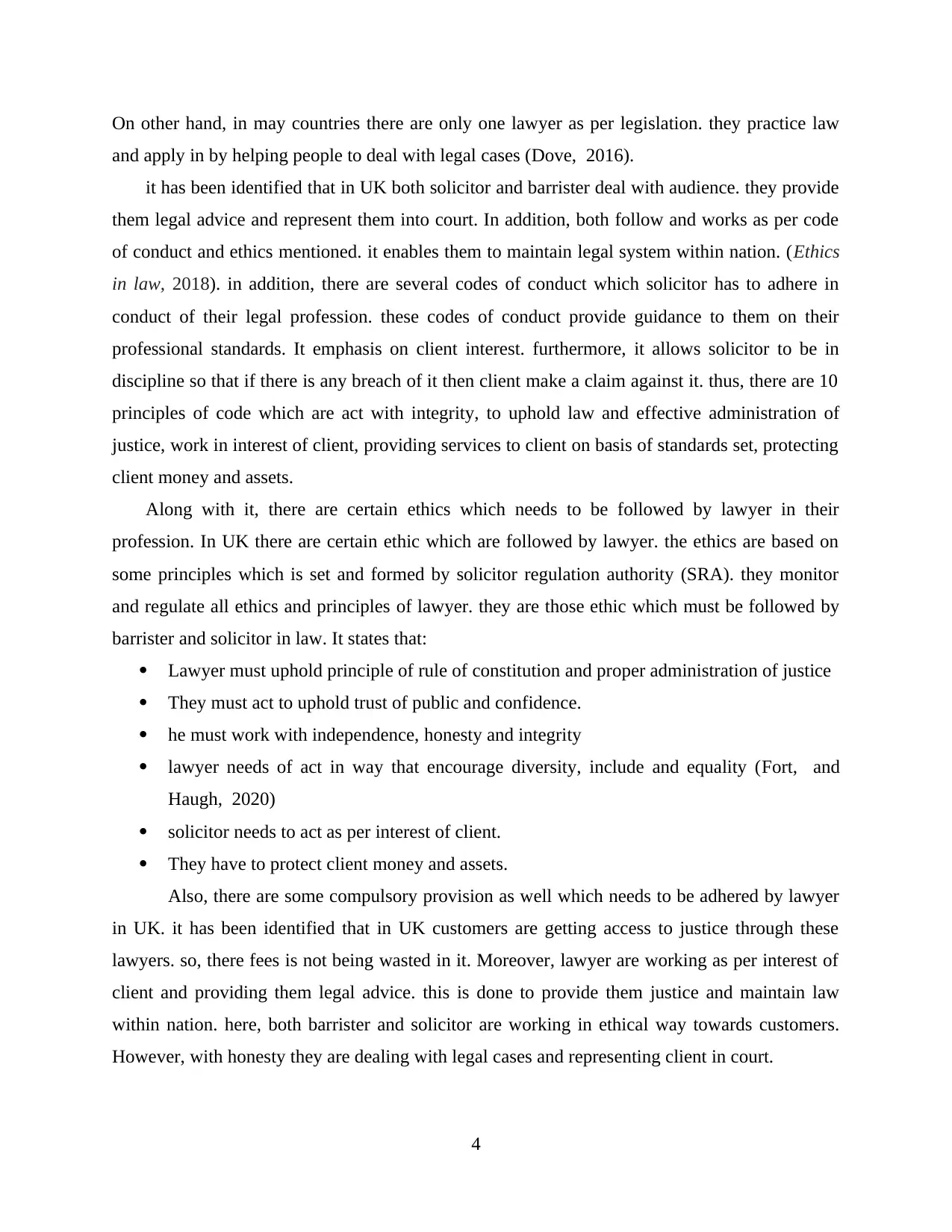
On other hand, in may countries there are only one lawyer as per legislation. they practice law
and apply in by helping people to deal with legal cases (Dove, 2016).
it has been identified that in UK both solicitor and barrister deal with audience. they provide
them legal advice and represent them into court. In addition, both follow and works as per code
of conduct and ethics mentioned. it enables them to maintain legal system within nation. (Ethics
in law, 2018). in addition, there are several codes of conduct which solicitor has to adhere in
conduct of their legal profession. these codes of conduct provide guidance to them on their
professional standards. It emphasis on client interest. furthermore, it allows solicitor to be in
discipline so that if there is any breach of it then client make a claim against it. thus, there are 10
principles of code which are act with integrity, to uphold law and effective administration of
justice, work in interest of client, providing services to client on basis of standards set, protecting
client money and assets.
Along with it, there are certain ethics which needs to be followed by lawyer in their
profession. In UK there are certain ethic which are followed by lawyer. the ethics are based on
some principles which is set and formed by solicitor regulation authority (SRA). they monitor
and regulate all ethics and principles of lawyer. they are those ethic which must be followed by
barrister and solicitor in law. It states that:
Lawyer must uphold principle of rule of constitution and proper administration of justice
They must act to uphold trust of public and confidence.
he must work with independence, honesty and integrity
lawyer needs of act in way that encourage diversity, include and equality (Fort, and
Haugh, 2020)
solicitor needs to act as per interest of client.
They have to protect client money and assets.
Also, there are some compulsory provision as well which needs to be adhered by lawyer
in UK. it has been identified that in UK customers are getting access to justice through these
lawyers. so, there fees is not being wasted in it. Moreover, lawyer are working as per interest of
client and providing them legal advice. this is done to provide them justice and maintain law
within nation. here, both barrister and solicitor are working in ethical way towards customers.
However, with honesty they are dealing with legal cases and representing client in court.
4
and apply in by helping people to deal with legal cases (Dove, 2016).
it has been identified that in UK both solicitor and barrister deal with audience. they provide
them legal advice and represent them into court. In addition, both follow and works as per code
of conduct and ethics mentioned. it enables them to maintain legal system within nation. (Ethics
in law, 2018). in addition, there are several codes of conduct which solicitor has to adhere in
conduct of their legal profession. these codes of conduct provide guidance to them on their
professional standards. It emphasis on client interest. furthermore, it allows solicitor to be in
discipline so that if there is any breach of it then client make a claim against it. thus, there are 10
principles of code which are act with integrity, to uphold law and effective administration of
justice, work in interest of client, providing services to client on basis of standards set, protecting
client money and assets.
Along with it, there are certain ethics which needs to be followed by lawyer in their
profession. In UK there are certain ethic which are followed by lawyer. the ethics are based on
some principles which is set and formed by solicitor regulation authority (SRA). they monitor
and regulate all ethics and principles of lawyer. they are those ethic which must be followed by
barrister and solicitor in law. It states that:
Lawyer must uphold principle of rule of constitution and proper administration of justice
They must act to uphold trust of public and confidence.
he must work with independence, honesty and integrity
lawyer needs of act in way that encourage diversity, include and equality (Fort, and
Haugh, 2020)
solicitor needs to act as per interest of client.
They have to protect client money and assets.
Also, there are some compulsory provision as well which needs to be adhered by lawyer
in UK. it has been identified that in UK customers are getting access to justice through these
lawyers. so, there fees is not being wasted in it. Moreover, lawyer are working as per interest of
client and providing them legal advice. this is done to provide them justice and maintain law
within nation. here, both barrister and solicitor are working in ethical way towards customers.
However, with honesty they are dealing with legal cases and representing client in court.
4
Paraphrase This Document
Need a fresh take? Get an instant paraphrase of this document with our AI Paraphraser
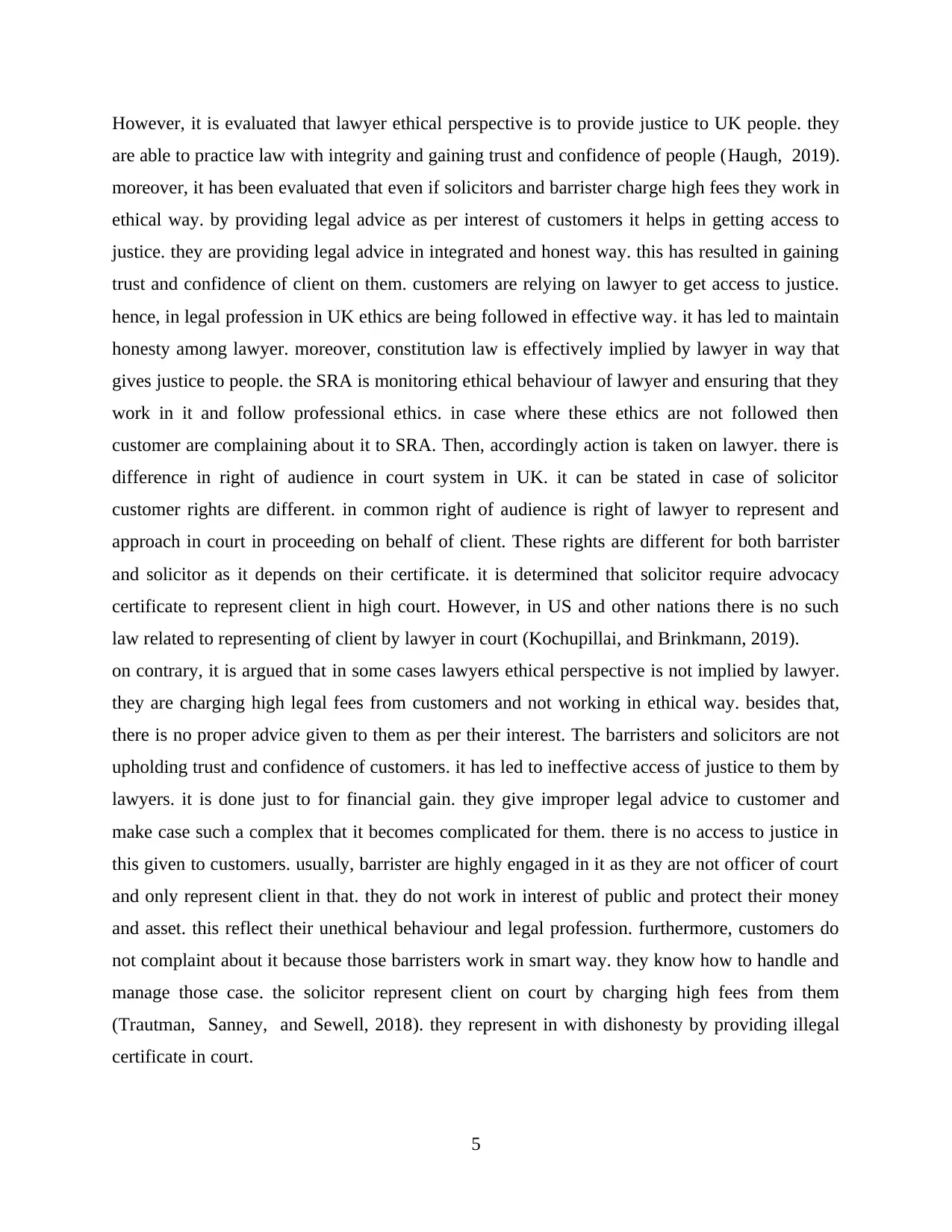
However, it is evaluated that lawyer ethical perspective is to provide justice to UK people. they
are able to practice law with integrity and gaining trust and confidence of people (Haugh, 2019).
moreover, it has been evaluated that even if solicitors and barrister charge high fees they work in
ethical way. by providing legal advice as per interest of customers it helps in getting access to
justice. they are providing legal advice in integrated and honest way. this has resulted in gaining
trust and confidence of client on them. customers are relying on lawyer to get access to justice.
hence, in legal profession in UK ethics are being followed in effective way. it has led to maintain
honesty among lawyer. moreover, constitution law is effectively implied by lawyer in way that
gives justice to people. the SRA is monitoring ethical behaviour of lawyer and ensuring that they
work in it and follow professional ethics. in case where these ethics are not followed then
customer are complaining about it to SRA. Then, accordingly action is taken on lawyer. there is
difference in right of audience in court system in UK. it can be stated in case of solicitor
customer rights are different. in common right of audience is right of lawyer to represent and
approach in court in proceeding on behalf of client. These rights are different for both barrister
and solicitor as it depends on their certificate. it is determined that solicitor require advocacy
certificate to represent client in high court. However, in US and other nations there is no such
law related to representing of client by lawyer in court (Kochupillai, and Brinkmann, 2019).
on contrary, it is argued that in some cases lawyers ethical perspective is not implied by lawyer.
they are charging high legal fees from customers and not working in ethical way. besides that,
there is no proper advice given to them as per their interest. The barristers and solicitors are not
upholding trust and confidence of customers. it has led to ineffective access of justice to them by
lawyers. it is done just to for financial gain. they give improper legal advice to customer and
make case such a complex that it becomes complicated for them. there is no access to justice in
this given to customers. usually, barrister are highly engaged in it as they are not officer of court
and only represent client in that. they do not work in interest of public and protect their money
and asset. this reflect their unethical behaviour and legal profession. furthermore, customers do
not complaint about it because those barristers work in smart way. they know how to handle and
manage those case. the solicitor represent client on court by charging high fees from them
(Trautman, Sanney, and Sewell, 2018). they represent in with dishonesty by providing illegal
certificate in court.
5
are able to practice law with integrity and gaining trust and confidence of people (Haugh, 2019).
moreover, it has been evaluated that even if solicitors and barrister charge high fees they work in
ethical way. by providing legal advice as per interest of customers it helps in getting access to
justice. they are providing legal advice in integrated and honest way. this has resulted in gaining
trust and confidence of client on them. customers are relying on lawyer to get access to justice.
hence, in legal profession in UK ethics are being followed in effective way. it has led to maintain
honesty among lawyer. moreover, constitution law is effectively implied by lawyer in way that
gives justice to people. the SRA is monitoring ethical behaviour of lawyer and ensuring that they
work in it and follow professional ethics. in case where these ethics are not followed then
customer are complaining about it to SRA. Then, accordingly action is taken on lawyer. there is
difference in right of audience in court system in UK. it can be stated in case of solicitor
customer rights are different. in common right of audience is right of lawyer to represent and
approach in court in proceeding on behalf of client. These rights are different for both barrister
and solicitor as it depends on their certificate. it is determined that solicitor require advocacy
certificate to represent client in high court. However, in US and other nations there is no such
law related to representing of client by lawyer in court (Kochupillai, and Brinkmann, 2019).
on contrary, it is argued that in some cases lawyers ethical perspective is not implied by lawyer.
they are charging high legal fees from customers and not working in ethical way. besides that,
there is no proper advice given to them as per their interest. The barristers and solicitors are not
upholding trust and confidence of customers. it has led to ineffective access of justice to them by
lawyers. it is done just to for financial gain. they give improper legal advice to customer and
make case such a complex that it becomes complicated for them. there is no access to justice in
this given to customers. usually, barrister are highly engaged in it as they are not officer of court
and only represent client in that. they do not work in interest of public and protect their money
and asset. this reflect their unethical behaviour and legal profession. furthermore, customers do
not complaint about it because those barristers work in smart way. they know how to handle and
manage those case. the solicitor represent client on court by charging high fees from them
(Trautman, Sanney, and Sewell, 2018). they represent in with dishonesty by providing illegal
certificate in court.
5
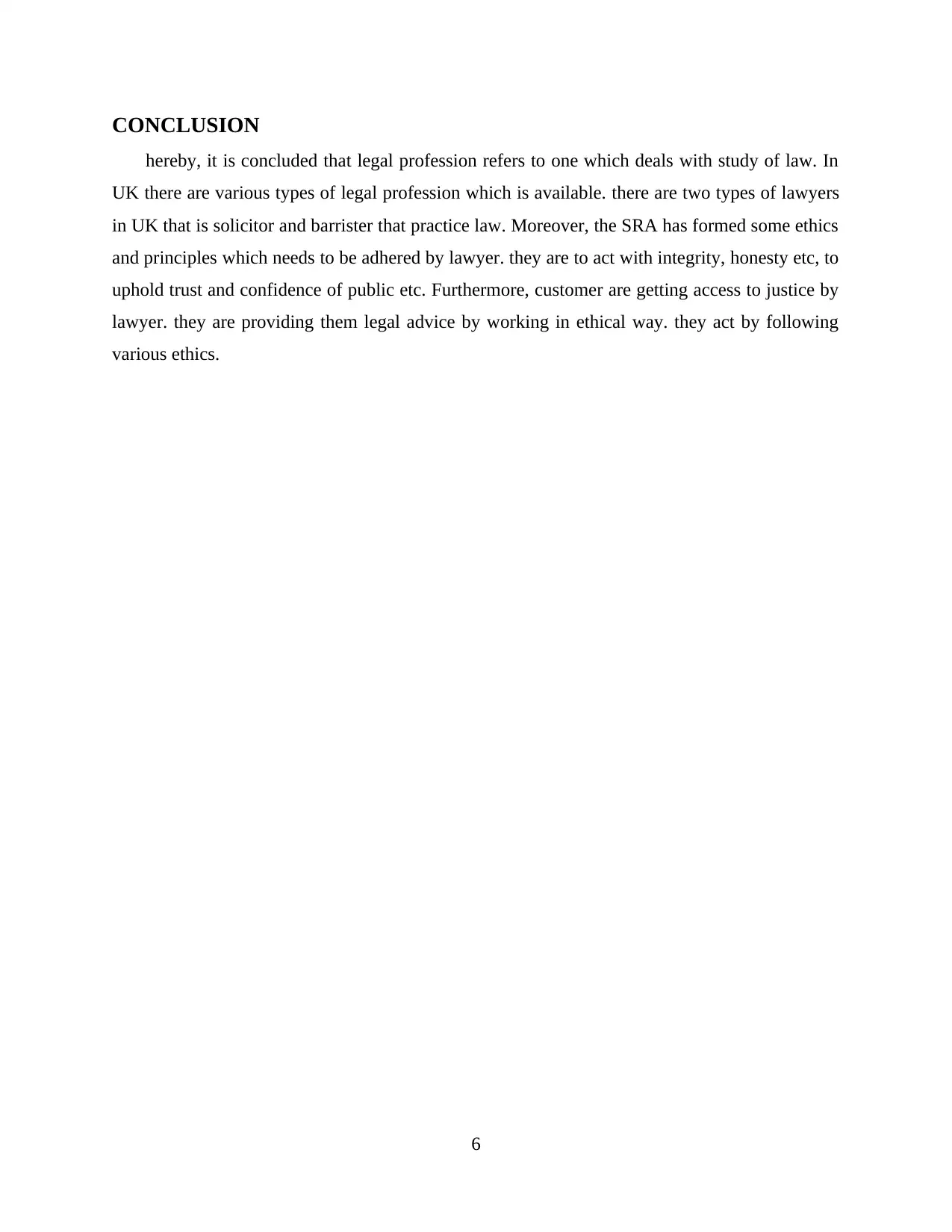
CONCLUSION
hereby, it is concluded that legal profession refers to one which deals with study of law. In
UK there are various types of legal profession which is available. there are two types of lawyers
in UK that is solicitor and barrister that practice law. Moreover, the SRA has formed some ethics
and principles which needs to be adhered by lawyer. they are to act with integrity, honesty etc, to
uphold trust and confidence of public etc. Furthermore, customer are getting access to justice by
lawyer. they are providing them legal advice by working in ethical way. they act by following
various ethics.
6
hereby, it is concluded that legal profession refers to one which deals with study of law. In
UK there are various types of legal profession which is available. there are two types of lawyers
in UK that is solicitor and barrister that practice law. Moreover, the SRA has formed some ethics
and principles which needs to be adhered by lawyer. they are to act with integrity, honesty etc, to
uphold trust and confidence of public etc. Furthermore, customer are getting access to justice by
lawyer. they are providing them legal advice by working in ethical way. they act by following
various ethics.
6
⊘ This is a preview!⊘
Do you want full access?
Subscribe today to unlock all pages.

Trusted by 1+ million students worldwide
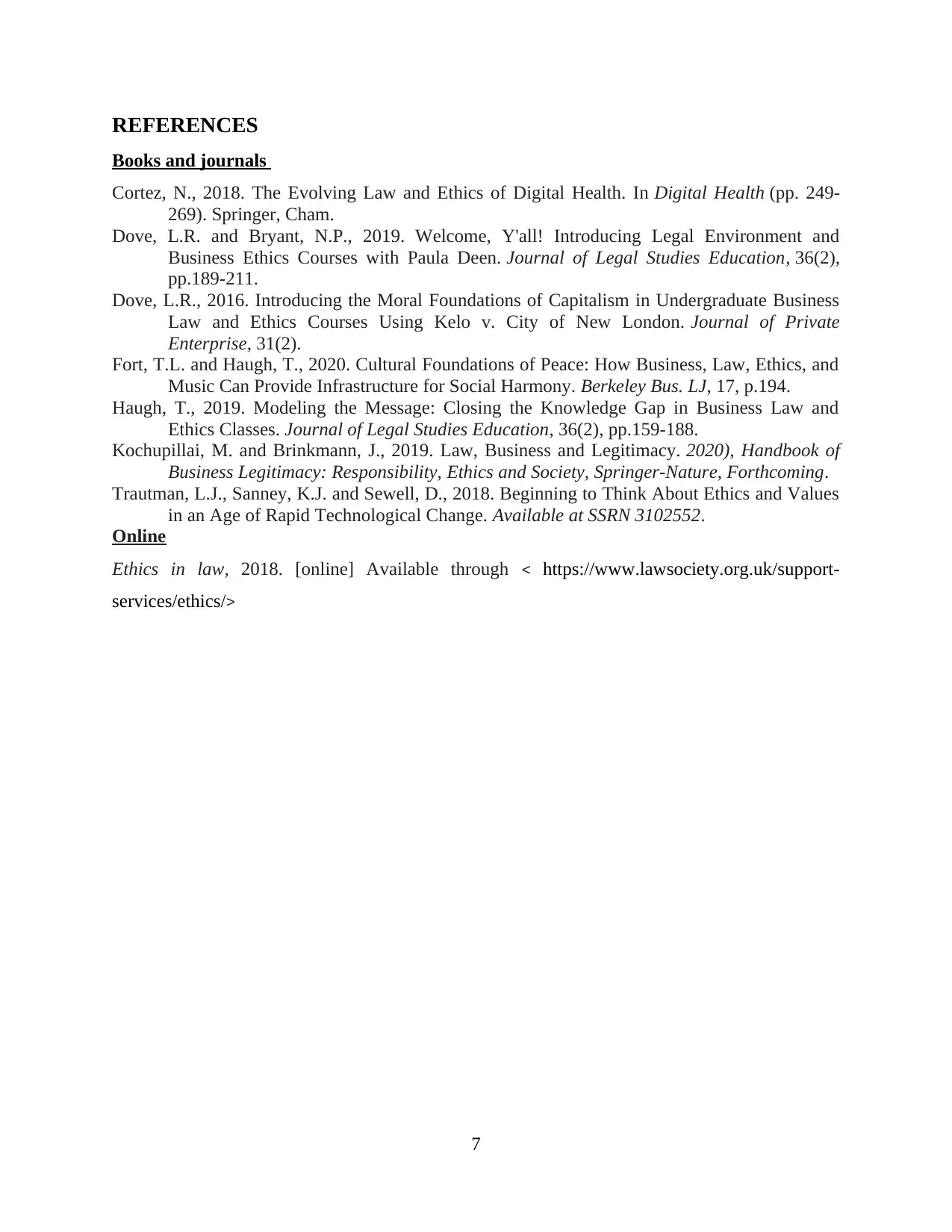
REFERENCES
Books and journals
Cortez, N., 2018. The Evolving Law and Ethics of Digital Health. In Digital Health (pp. 249-
269). Springer, Cham.
Dove, L.R. and Bryant, N.P., 2019. Welcome, Y'all! Introducing Legal Environment and
Business Ethics Courses with Paula Deen. Journal of Legal Studies Education, 36(2),
pp.189-211.
Dove, L.R., 2016. Introducing the Moral Foundations of Capitalism in Undergraduate Business
Law and Ethics Courses Using Kelo v. City of New London. Journal of Private
Enterprise, 31(2).
Fort, T.L. and Haugh, T., 2020. Cultural Foundations of Peace: How Business, Law, Ethics, and
Music Can Provide Infrastructure for Social Harmony. Berkeley Bus. LJ, 17, p.194.
Haugh, T., 2019. Modeling the Message: Closing the Knowledge Gap in Business Law and
Ethics Classes. Journal of Legal Studies Education, 36(2), pp.159-188.
Kochupillai, M. and Brinkmann, J., 2019. Law, Business and Legitimacy. 2020), Handbook of
Business Legitimacy: Responsibility, Ethics and Society, Springer-Nature, Forthcoming.
Trautman, L.J., Sanney, K.J. and Sewell, D., 2018. Beginning to Think About Ethics and Values
in an Age of Rapid Technological Change. Available at SSRN 3102552.
Online
Ethics in law, 2018. [online] Available through < https://www.lawsociety.org.uk/support-
services/ethics/>
7
Books and journals
Cortez, N., 2018. The Evolving Law and Ethics of Digital Health. In Digital Health (pp. 249-
269). Springer, Cham.
Dove, L.R. and Bryant, N.P., 2019. Welcome, Y'all! Introducing Legal Environment and
Business Ethics Courses with Paula Deen. Journal of Legal Studies Education, 36(2),
pp.189-211.
Dove, L.R., 2016. Introducing the Moral Foundations of Capitalism in Undergraduate Business
Law and Ethics Courses Using Kelo v. City of New London. Journal of Private
Enterprise, 31(2).
Fort, T.L. and Haugh, T., 2020. Cultural Foundations of Peace: How Business, Law, Ethics, and
Music Can Provide Infrastructure for Social Harmony. Berkeley Bus. LJ, 17, p.194.
Haugh, T., 2019. Modeling the Message: Closing the Knowledge Gap in Business Law and
Ethics Classes. Journal of Legal Studies Education, 36(2), pp.159-188.
Kochupillai, M. and Brinkmann, J., 2019. Law, Business and Legitimacy. 2020), Handbook of
Business Legitimacy: Responsibility, Ethics and Society, Springer-Nature, Forthcoming.
Trautman, L.J., Sanney, K.J. and Sewell, D., 2018. Beginning to Think About Ethics and Values
in an Age of Rapid Technological Change. Available at SSRN 3102552.
Online
Ethics in law, 2018. [online] Available through < https://www.lawsociety.org.uk/support-
services/ethics/>
7
1 out of 7
Related Documents
Your All-in-One AI-Powered Toolkit for Academic Success.
+13062052269
info@desklib.com
Available 24*7 on WhatsApp / Email
![[object Object]](/_next/static/media/star-bottom.7253800d.svg)
Unlock your academic potential
Copyright © 2020–2026 A2Z Services. All Rights Reserved. Developed and managed by ZUCOL.





